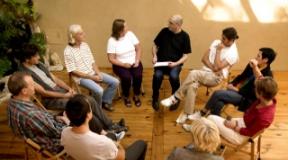An open letter from the parents of children with ADHD to the Minister of Education of Russia. Our inattentive hyperactive children Our inattentive hyperactive children cannot register
Training in methods of activity, particular questions ...). These mistakes can be made by parents, who generally do not experience great difficulties in relationships with their children, but do not have special information and do not have enough skills to deal with them. Such parents will find it very useful advice on how to instill self-organization skills, how to teach a child to plan, how to help him do his homework, how to achieve what he wants step by step ... It is such specific advice that specialists often give, and they are posted in large numbers, including and on our website.
The second are more profound errors related to the parental position in relation to the child; caused by the personal deformation of the parents. They are the most difficult, because the parents themselves need correction. Until these errors are corrected, errors of the first type cannot be fixed either. Even if parents try to apply special techniques, they will very soon find that these techniques either "do not work" as they should, or the parents cannot withstand the intended strategy for a long time, again breaking into a cry and getting irritated, or the child himself refuses to do anything was to do.
Often a parent's request sounds something like this: "How to get rid of such and such a lack of a child?" A request is a request to cope with a specific problem, but it turns out that the main problem lies in the perception of the child by the parents, and it depends on their attitude towards the child. It is impossible to correct one particular quality, the whole family needs restructuring: the way of life, the relationship of the spouses, the attitude towards the child, the views of the parents on life ... Children very accurately reflect the state of the family life of the parents. The lack of a child is only a symptom of a general family problem.
Often, in order for the "killed" relationship to get off the ground, it is enough for one of the parents to take the trouble to correct their own position. Then the changes that will take place in him and in his attitude towards the child, willy-nilly, will give impetus to new, positive moods, and thus will contribute to positive changes in the child.
The mechanism of formation of pathological qualities in children with ADHD
What has been said is true for any child, even a prosperous one. But if in families where children are mostly healthy, they cope with difficulties at the very least, and the shortcomings of children are less striking, then where children with ADHD grow up, intra-family conflicts are exacerbated to the extreme. In our families, the problem of relationships is especially acute, it reveals our own difficulties. Without exaggeration, ADHD can be called both a developer of parents' personal problems and their catalyst. Therefore, we will focus on fundamental psychological attitudes.
During pregnancy, mothers have a certain image of the unborn child in their minds. They endow him with desirable qualities, make plans for his future life, dream of great success in life for unborn children. A child with ADHD usually begins to act contrary to mom's expectations as early as infancy. He is excitable, restless, does not sleep well, often cries, does not get used to the regime well and gives a lot of trouble to exhausted parents. In addition, such children often do not fit into the age norms of neuropsychic development, which generally plunges their parents into panic. Therefore, there are often cases when, along with anxiety, the mother begins to feel a latent dislike for the baby, which she is afraid to admit even to herself. She treats the child a little more harshly than the mother of his healthy peer, often loses her temper, screams. Already by the age of one year, such a child receives the experience of maternal rejection, which cannot but affect his mental state. From the fact that everything goes "wrong", the mother begins to feel guilty and even more hostile to the baby, who unwittingly became the cause of such painful experiences. This mood of the mother again does not affect the child in the best way. A vicious circle is formed.
Such a circle does not necessarily begin to "wind up" in infancy. A feature of a child that scares parents can come to light at any age, and the mechanism of rejection starts ...
Love and acceptance are the conditions for full-fledged neuropsychic development
Psychologists talk about acceptance all the time. What it is? This is the recognition of the child's right to individuality and dissimilarity to anyone, including parents; this understanding that a child has the right to be himself, is not obliged to meet anyone's expectations, to fulfill someone's conceived program ... this is an assertion of the unique existence of this particular person, with all his inherent qualities.
Acceptance is essential to parental love. When a child is accepted, he feels parental love (otherwise he doubts it). It does not depend on the time spent with the child; on whether he is at home or in the garden, material conditions, formal care ... Only with the child's confidence in parental love is the correct formation of his mental world possible.
Relationship, dialogue, contact
For a child to feel parental love, there must be good emotional contact between children and parents. This is a sincere interest in the child's affairs, even the smallest, trifling (from the parents' point of view), curiosity, the desire to understand what changes are taking place with the child ... Such interest has nothing to do with formal, visible care. Moreover, the apparent solicitude of other parents, the numerous activities in which the child is included on their initiative, do not always contribute to the achievement of this most important educational task. Therefore, it is not so important what exactly to do with the child, but you should always take care of maintaining contact - at any age, regardless of his individual characteristics, the attitude of others towards him, his objective success ... If parents want the child to strive to become better , achieved something, the first thing they should care about is maintaining good contact with him. Contact does not arise by itself; parents have to build it.
What does it take to build and maintain good emotional contact (relationship) with a child? Some kind of dialogue is needed, the interaction of the child and the adult with each other. The child should always understand what the parent is doing and why, what guides he is in communicating with him. The child should not be an object of educational influences, but an ally in a common family life. He must participate in it as an equal (whereas the usual position of the parents is “above” the child). The usual parental position is this: an adult is older, more experienced, knows more, has strength and independence ... the child is stupid, inexperienced, defenseless, dependent ... But parents should not think about this. It is important to respect the potential of the child, affirm the value of his present day ... understanding that childhood is a full-fledged stage of life, that the child is not an "unfinished" adult ... it is necessary to recognize him as an equal, but passing through a certain stage of life.

Errors caused by lack of acceptance
Lack of acceptance manifests itself in misbehaving parents, such as:
- Expressing assessments: "Stupid!", "How many times to explain to you!", "Any fool in your place would have guessed" ... This statement may even be fair, but it does not matter, because it harms the relationship. Therefore, in such reactions one must (at least) slow down oneself. It is a rule to condemn a specific act without associating it with a person! (The rule "not to be attributed to a person" also applies to praise). Personality should never be judged - neither positively nor negatively!
- Frequent twitching, censure. We are uncomfortable, embarrassed for the child's behavior, we kind of make excuses. In the case of the so-called repressive-accusatory upbringing, when a child accidentally or unknowingly does something wrong, the parents tend to accuse him rather than support him.
- Constant indications of the child's shortcomings (supposedly to correct). In fact, acceptance means understanding that the child is developing, constantly improving. And he will want to cope with his disadvantage himself, subject to parental support and trust. You need to believe that there is a lot of good and strong in a child, and it will gradually prevail. That is, parents need not to fix the shortcomings, but to reinforce their merits, to give strength for the child's independent struggle with his shortcoming.
- Inattention to the positive sides of the personality. The good thing about a child is as if it is "right," we hardly notice him. But this is the basis for correcting shortcomings. Therefore, it is often said: "The child must be praised." To praise means to recognize dignity, to emphasize the positive, to focus on it. Even the seemingly petty merits of the child must be constantly "pulled out" - otherwise the child will get the impression of his own complete worthlessness and the futility of any effort.
- Ignoring age and individual characteristics. Parents are often guided by their ideas about the qualities desirable for the child and treat the child as if he already possesses them, but does not want to "try" and "do the right thing." You need to constantly ask yourself the question about the limits of the child's capabilities. These limits (especially for children with ADHD) can be significantly lower than for other children of the same age. Nevertheless, you need to constantly explore these boundaries and understand that at the moment this is the ceiling of the child's capabilities. To demand more of him is unreasonable and cruel.
- Edifications, directives. "You have to ..." "You're not doing anything again." Parents issue a circular, but do not provide support and active assistance. In case of failure, a rebuke follows. The factor of obligation obliges, it is capable of becoming a powerful destructive force. Children actively oppose this position, try to protest. When a child does not cope with an assignment (which is often perceived by parents as his active reluctance, "laziness"), it is necessary to do it together with him, while not stopping friendly communication, showing how to do this, without associating the assignment with negative emotions. This applies, for example, to household chores: cleaning should be joint (mother can clean his territory, the child - his own. If he does not succeed in this, then it is better to clean his room together ...).
- Lack of attention to the needs and concerns of the child. On the forum, questions often sound: "How can I fix this and that in it?", And very rarely the questions reflect the parents' desire to help the child himself: "The child is worried, wants to do, but it does not work out ..." children, do they strive for what their parents want from them. But for success in the fight against the "negative" qualities of their children, children, the desire to cope with themselves is necessary.
Reasons for rejection (which parents themselves should think about)
- General dissatisfaction with life, dissatisfaction with "how everything turned out," marriage, work, "what I have" - \u200b\u200beverything is bad, and even the child is "not like that."
- The authoritarian nature of the mother, designed to compensate for the insufficient influence of the father in upbringing (based on dissatisfaction with the marriage) ... Often, for example, the mother places some hopes on the child due to the fact that her expectations regarding marriage were not met. But a child with ADHD falls short of the mother's expectations.
- Increased anxiety of the mother ("If the child is not what I imagine him to be, it will be bad. ADHD in the child is dangerous for his future ..."), uncertainty about the future, fears - all this blocks the child's independence, denies the good in him ( this good, according to the mother, is not enough, and in general it does not matter) ... Hyper-care can also be associated with increased anxiety.
- The mother's personal immaturity is, relatively speaking, a misunderstanding of life values \u200b\u200band priorities. This is usually expressed in attitudes: "to study well at school", "go to a good institute", "make a career", "achieve a position", "have a high-paying job", etc. But it is overlooked that a person can have everything this, but not to feel happy - our life, unfortunately, confirms this at every step. When a child does an excellent job at school, but does not understand why this is necessary, enters an unloved institute, his position does not bring him satisfaction, and he hates his work, and his personal life does not work out, it becomes clear that there is something in life something else that his parents could not convey to him. ADHD can be a hindrance in the realization of attitudes towards "having", but it does not at all interfere with attitudes towards "being" - that is, a person's desire to become what he can become, to reach his own maximum.
- Parents' attempts to compensate for the failed (in their opinion) own life with the child's successes. When parents have not been able to achieve some life goals, they tend to pin unreasonably high hopes on the child. It is clear that ADHD is a difficult obstacle to the realization of this attitude.
Motives of education
Errors associated with rejection depend on the place in the structure of the personality of the parents is occupied by the motives of upbringing (that is, here we touch on the very foundations of the personality - its need-motivational structure).
- Need for emotional contact. When a mother has no loved ones, she is afraid of loneliness and seeks to "tie" the child to herself, to make him dependent on herself. As a result, he is also overprotective. ADHD in the mother's mind acts as an excuse ("it needs to be controlled all the time ..."). You need to honestly answer the question: why am I afraid to let him go? for whom am I afraid? The mother must learn to separate the child's real need for care from her desire to constantly keep him close to her.
- The need for meaning in life. The mother has nothing in her life, her days are not filled with anything, so she seeks to fill them with worries about the child: constant activities, talking about him, attention to every little thing ... A woman decides questions of her own life. The child's illness justifies such concerns, gives them a noble meaning. Oddly enough, but it is “beneficial” for the mother that the child does not cope, is ill, remains dependent (a good illustration is the story of P. Sanaev “Bury me behind the plinth”: the grandmother's life was empty, so the diseases of the little grandson justified life itself and filled it meaning).
- The need for achievement. When this need of the parents is not properly satisfied, the child is obliged to fulfill their dream. The fixation on the child's achievements, the desire to "develop", the desire for the child to demonstrate success, to be the best - can serve as examples of an educational attitude associated with an unrealized need for achievement. If a child achieves something, this, of course, is not bad, but you must always be aware of where his good comes first, and where his own ambitions. It is clear that ADHD interferes with this parental need.
- Education is understood as the task of forming certain qualities. Parents have an idea of \u200b\u200bsome overvalued quality (more often it is a whole set) - intelligence, erudition, athletic fitness, diligence, purposefulness ... Parents impose these qualities on the child, trying to prove that a full life is impossible without these qualities, but by doing so they they deny him himself - they show that he does not suit them as he is. Children with ADHD rarely have these qualities and therefore annoy their parents.
- The need for a comfortable existence, for getting rid of problems. The child should behave in such a way that the parents can "not strain", "not take a steam bath", provide them with a quiet life. ADHD is perceived as a defect incompatible with a fulfilling life, and one wants to reduce its impact to zero. ADHD may not bother the child so much as the parent. And he interferes with the child indirectly: it is not the ADHD itself that creates the problems, but the parental attitude towards him. This is quite difficult to differentiate, since children always reflect parental influence (if the parents are disturbed by the peculiarities of the children, then the children themselves are likely to consider the same). But this must be discerned.
- The need for others to accept, in accordance with social norms, hypersocial attitudes. A child unable to fulfill the requirement of compliance with high social standards experiences rejection not only of society, but also of parents. They do not provide him with support, do not take his side, fight against him, support those who condemn the child.
Conclusion: parents must understand what position they are guided by, and have the courage to admit it in themselves, and then be able to refuse it. And this is a task for your own. If the parents themselves cannot cope with this task, they need qualified help.
Consequences of inadequate parenting
These are the symptoms of ADHD. By itself, ADHD does not cause gross behavioral disorders, they develop on the basis of the individual characteristics of the nervous system (plus the parental attitude towards the child makes a contribution) as secondary disorders, that is, caused by specific living conditions in society. Disorders of sleep and appetite, fears, deviant (deviating from generally accepted behavior), laziness, addictions, aggressiveness, rudeness, stubbornness, lethargy and apathy come to the surface ... Parents try to cope with symptoms: they take to doctors, correct, punish, force but there are almost no results. After all, the elimination of symptoms does not lead to getting rid of the cause - and the reason lies in the absence of full-fledged contact and inadequate understanding of educational tasks.
"Perfect parenting"
From the above it is easy to conclude that there is no ideal upbringing - it depends on the characteristics and traits of a particular child. However, in "ideal" families, three basic conditions are fulfilled: good emotional contact (close relations between children and parents); the child's confidence in parental love; clear, definite rules of conduct, followed by both parents and children.
The parental position of "ideal" parents is different:
- adequacy (the ability to understand the individuality of the child, to see his strengths and weaknesses);
- flexibility (the ability to see where the child's development is headed, the ability to follow him, monitor changes, adjust the style of his behavior);
- predictiveness (the ability not only to see how the child is changing, but also to create the basis for further positive changes by their actions - to expand the area of \u200b\u200bresponsibility, to provide independence ...).
It would be unfair to reproach parents for not loving their children. But the fact is that parents love their children as "as they can", and the child often needs another love, the main property of which is a friendly attitude towards the child. The main parental task is not to adjust the child to his worldview (which, in turn, was formed under the influence of grandparental mistakes and various life circumstances). The child's characteristics should be prioritized, not their own views, the demands of society, the assessments of others, their own idea of \u200b\u200bwhat should be ... This is what parents should free themselves from in general. You cannot apply the type of upbringing that is convenient for the parent - you need to look for the best way for the child, learn to see what the child's soul is in itself (after all, ADHD is also a given, you need to learn to live with it ...).
When a child makes attempts to try his hand and find a sphere of application of his abilities (and this can happen already before school), parents should take an active part in organizing his life in accordance with these abilities. Not to break his plans, not to try to realize his plans, but to be able to see them and adjust flexibly - to create conditions, to shape the environment, to participate in the development of the child's abilities.
And then ADHD should be corrected if it interferes with the child himself from fulfilling his plans.
Currently, more and more parents are looking for an answer to the question of what to do if doctors have diagnosed a "hyperactive child". Unfortunately, excessive activity prevents the baby from leading a normal life, so there is a need to give practical advice for adults who are faced with such a pathology in children.
Scientists have separated hyperactivity from other pathologies and defined "Attention deficit hyperactivity disorder" (ADHD). However, such a deviation in the psyche has not yet been fully investigated.
To distinguish a hyperactive child from a simple fidget, you need to pay attention to the following characteristics:
- An active kid has great cognitive interest and uses his restlessness to gain new knowledge. Unlike a hyperactively aggressive child who neglects the opinions of others, he listens to the comments of adults, happily enters the game.
- Fidgets rarely show strong emotions; in unfamiliar conditions they behave more calmly.
- The lack of inclination to provocations of active kids helps them build conflict-free relationships with other children, which is beyond the control of hyperactive children.
- Children without mental abnormalities have a sound sleep, they are energetic, but obedient.
Such a disorder manifests itself at the age of two years. However, there are some signs of a hyperactive child that can be noticed in a year. Often adults do not pay attention to this until the toddler grows up. Then they begin to expect more independence from him. However, the baby is unable to show her due to mental development disorders.
Boys are more likely to suffer from attention deficit disorder. Their number reaches 22%, and the number of girls with ADHD is only 10%.
Why is the child hyperactive?
There are many reasons for this disorder. The most common ones are:
- Infectious diseases carried by children at an early age.
- Stress, hard physical work of the mother during gestation.
- The mother's taking drugs, alcohol.
- Head injury during childbirth.
- Heavy or premature labor.
- Poor or improper diet of the crumbs.
- The disease can be transmitted at the genetic level.
- Family conflicts.
- Authoritarian parenting style.
What kind of child can be called hyperactive?

Medical specialists classify a child as "hyperactive" if he has the following symptoms:
- Passion for the work lasts no more than 10 minutes. With any distraction, his attention switches.
- The toddler is constantly agitated, inattentive. During classes or lessons, he cannot sit still, constantly moves, twitches.
- His behavior is not burdened by shyness. Shows disobedience even in unfamiliar places.
- Asks many questions, but does not need an answer. Sometimes he gives an answer without hearing the whole sentence. During games, it requires everyone to focus on his person.
- Speech accelerated, swallows the endings of words. Often jumps from one action to another, without finishing what he started.
- Restless sleep is one of the signs of a hyperactive child. Nightmares, urinary incontinence occur.
- Constant conflicts with peers prevent you from making friends. He cannot play calmly, interferes with the game of other guys. During lessons, he shouts out from his seat, interferes with his behavior.
- Hyperactive children often do not master the curriculum of the school course.
- Abnormalities in the brain when processing information. Performing tasks, he often has difficulties.
- It seems that the child does not hear what the adults tell him.
- Absent-minded, loses personal belongings, school supplies, toys.
- Awkwardness in the movements of a hyperactive child is often the cause of injury and damage to things.
- Has problems with fine motor skills: has difficulty buttoning, tying laces, calligraphy.
- Does not respond to comments from adults, prohibitions, punishments ().
- Prone to frequent headaches, there are nervous tics.
Remember, only a doctor can diagnose ADHD. Moreover, only if the doctor found at least 8 symptoms of a hyperactive child. Diagnosis is based on the results of brain MRI, EEG, and blood tests. With sufficiently developed mental abilities, such children have problems with speech, fine motor skills, and low cognitive interest. Mediocre learning ability, weak motivation for learning activities does not give our inattentive hyperactive children an opportunity to receive a high level of education.
If your child was diagnosed with such a diagnosis, do not be afraid and give up. There is no need to hope that the problem will resolve itself. A hyperactive child really needs help from parents and advice from specialists.
What should a parent of a hyperactive child do?

To solve the problem, parents of hyperactive children should consider the following tips:
- Take care of your daily routine. Do not forget about daily rituals: systematic reading of bedtime stories or morning exercises will extinguish the excessive overexcitation of the baby. Try not to change the regime moments. This will save from evening tantrums, make his sleep calmer.
- Weather in the house. A friendly and non-conflict family relationship will reduce destructive activity. Avoid noisy parties, unexpected guests.
- Sections. Sports activities will direct the energy of the zest in a positive direction. Control the regularity of attending classes, for a hyperactive child this is important. Avoid competitive sports. Better to choose aerobics, skiing, swimming. Has a beneficial effect on the development of thinking of the little one playing chess. During chess games, both hemispheres work at the same time, which positively affects the development of mental abilities.
- Burst of energy. If the behavior of children does not interfere with those around them, you do not need to restrain them. Let them express their emotions. After such "self-cleaning" the child will become calmer.
- Punishments. When there is a need for educational influences, try not to choose such punishments in which the little one will have to sit still for a long time. For him, this is an impossible task.
- Golden mean. No need to put too much pressure on the fidget. Excessive requirements, rigidity in raising a hyperactive child will only harm. But you should beware of unnecessary care for such a baby. Children feel the weakness of adults, they quickly learn to manipulate. Then the upbringing of overly active children becomes uncontrollable.
- Nutrition. Food for such children should be healthy. Eliminate sweets, foods with artificial additives, sausages, convenience foods. You can improve brain function by taking a complex of vitamins in the off-season. The daily menu should contain vegetables and fruits. Be sure to introduce foods containing calcium, iron, magnesium into the diet.
- Extra impressions. Crowded places excite a hyperactive toddler. Avoid visiting supermarkets and public transport together.
- The television. Limit TV viewing with aggressive content. However, a couple of good cartoons a day will help. While watching TV, the fidget trains perseverance.
- Promotion. Do not spare words of praise for too active children. It is important for them to realize that they are on their way to victory over negativism.
Treatment and correction of a hyperactive child

There are some practical tips for treating a hyperactive child:
- Massotherapy. The prescribed massage will help relieve muscle tension, soothe the baby, relax him.
- Physiotherapy. Improves the supply of the cerebral cortex with blood electrophoresis with drugs.
- Psychologist consultation. Play therapy will help to correct behavior and learn how to restrain impulsive impulses. Classes with a psychologist or psychotherapist develop the baby's speech, improve the fine motor skills of the hands of a hyperactive child. With systematic exercise, attention is improved.
- Therapeutic gymnastics, swimming pool. With their help, the nervous system is strengthened, and excess energy goes away.
- Alekseev's technique, autogenous training, Schultz's model. These sets of exercises will be useful for relaxing the muscles, they will help him sleep peacefully. At first, such therapeutic work with a hyperactive child is carried out only under the supervision of a specialist.
Psychologists give the following advice to parents of a hyperactive child:
- Treat your child's hyperactivity disorder not as flaws, but as personality traits.
- Be prepared that such a kid will not hear your requests the first time, be patient and repeat them several times.
- Do not shout at fidgets. Your agitation will badly affect the little one, he will lose control over his emotions. Better to hug the baby to you, stroke him gently, then in a low voice ask what happened to him. Repetitive phrases calm, relax the fidget.
- Music helps to tune the baby to a calm positive mood. Play classical music more often, or enroll it in a music school.
- Try not to give the zinger a lot of toys at once. Let your toddler learn to focus on a single subject.
- The hyperactive child should have his own cozy corner in which he will curb negative emotions and come to his senses. Your own room with walls in a neutral color is suitable for this. It should contain favorite things, toys that help him to relieve unnecessary nervousness.
- Watch the child's behavior closely. At the first sign of growing aggression, switch his attention to other activities. Hysterical attacks are easier to stop at the initial stage.
How to calm a hyperactive child?
You can also treat a hyperactive child at home using:
- Medicines... This method should be resorted to last. The doctor may prescribe herbal sedatives. Nootropic drugs have a beneficial effect on metabolic processes in the cerebral cortex, improve memory and attention of the baby. You should not expect quick results from sedatives for hyperactive children, the drugs will take effect only after a few months.
- Relaxing baths... Soothing baths can be used daily before bed. The water temperature should not be higher than 38. Add the extract from hop cones and needles to the water.
- Folk remedies... To relieve stress, decoctions of soothing herbs are used. They are taken half a glass twice a day. You can prepare a mixture to strengthen the nervous system from cranberries with aloe, twisted in a meat grinder, with the addition of honey. This delicious nutritional formula is given in a six-month course three times a day.
Dr. Komarovsky about a hyperactive child
The famous Ukrainian pediatrician Yevgeny Komarovsky believes that:
- A child who has problems communicating with friends at school or in kindergarten can be considered hyperactive. If the team does not accept the toddler, and the school curriculum is not assimilated, then we can talk about the disease.
- In order for the hyperactive toddler to listen to your words, you must first attract his attention to himself. When the baby is busy with something, he is unlikely to respond to the request of the parents.
- You don't need to change your mind. If you prohibit something, then this prohibition should be in effect constantly, and not from time to time.
- Safety in a family with fidgets should come first. It is necessary to organize the living space for hyperactive children so that he cannot injure himself while playing. Demand composure and accuracy not only from the baby, but also from yourself.
- There is no need to ask a zinger to perform complex tasks. Try to divide this work into simple steps, so you will achieve better results. Use the action plan in pictures.
- It should be praised whenever possible. Even if the little artist has not completely painted the picture, praise him for his accuracy and diligence.
- You need to take care of your own vacation. Parents should rest whenever possible. You can use the help of relatives and ask them to take a little walk with the baby. When raising hyperactive children, the calmness and balance of his parents is very important.
Your special baby should have no doubt that his parents love him very much. The correct behavior of parents in raising a hyperactive child will solve this problem. Pay attention to the little one, follow the advice of experts.
Olesya Yurchenko
Abstract of the workshop "Our inattentive hyperactive children"
purpose: discuss the problem hyperactivity in children; develop ways to respond to problem situations; help parents build confidence in their own educational influences.
Event progress
I. Introduction
Leading: Translated from Latin "active" means active, efficient, and the Greek word « hyper» indicates excess of the norm. Hyperactivity in children, it manifests itself unusual for a normal, age-appropriate, child's development carelessness, distraction, impulsivity. In describing such children, they use terms: "Movable", Energizer, "Perpetual motion machine", "Volcano".
If a child hyperactive, then difficulties are experienced not only by himself, but also by him environment: parents, teachers, peers ... Such a child needs timely help, otherwise an asocial or even psychopathic personality may develop in the future.
What is hyperactivity? (Parents' statements.)
II. Psychologist's message about hyperactivity
Psychologist: Under hyperactivity it is customary to understand overly restless physical and mental activity in children, when arousal prevails over inhibition. Doctors believe that hyperactivity is the result of very minor brain damage. Signs hyperactivity appear in a child at an early age. In the future, his emotional instability often leads to conflicts in the family, in kindergarten, at school.
Diagnostic symptoms hyperactive children
Dear parents, if a statement is constantly characteristic of your child, write yourself 1 point, if not - 0 points.
1. Restless movements in the hands and feet.
2. Sitting on a chair, spinning, often changes posture, especially during purposeful activity.
3. Easily distracted by any extraneous stimuli.
4. With difficulty waiting for his turn during games and in various situations in a team.
5. Answers questions without hesitation, without listening to them to the end.
6. When performing the proposed tasks, she experiences difficulties associated with misunderstanding of instructions, problems of planning and organizing activities.
7. Has difficulty retaining attention during games, often moves from one incomplete action to another.
8. Cannot play quietly, calmly.
9. Often interferes with others, sticks to others (for example, interferes with other children's play).
10. He talks a lot himself, but does not listen to the speech addressed to him.
11. Often loses things (e.g. toys, pencils, books).
12. Often performs dangerous actions without thinking about the consequences (for example, runs out into the street without looking around).
If at least 8 of the listed signs appear in the child's behavior dailyfor at least half a year. Then we can talk about attention deficit disorder.
Attention deficit disorder has recently been defined as a disease. This means that the child wants, but cannot, change his behavior at the request of adults. Special tactics of working with such a child are required, and sometimes treatment. ADHD is the most common form of behavior disorder. About 15-20% of children with ADHD, and 3-5 times more common in boys.
The main symptoms of deficiency syndrome attention:
Attention disorder
Increased physical activity,
Impulsiveness.
Problems hyperactive children are not solved overnight by one person. This problem requires attention from both parents and doctors, educators and psychologists. Only an integrated approach can guarantee success in overcoming the negative manifestations of this syndrome. Correction in the family is very important. Enrich and diversify emotional experiences hyperactive child, to help him master the elementary actions of self-control and thereby somewhat smooth out the manifestations of increased motor activity means to change his relationship with a close adult, and above all with his mother. This will be facilitated by any action, any situation, an event aimed at deepening contacts, their emotional enrichment.
III. Unconditional acceptance. What does it mean?
Group discussion of parental statements.
To accept a child unconditionally means to love him not because he is beautiful, intelligent, calm, helper, but just because he is.
You can express your dissatisfaction with individual actions of the child, but not with the child as a whole.
You can condemn the child's actions, but not his feelings, no matter how undesirable or "Impermissible" they were neither.
Dissatisfaction with the child's actions should not be systematic, otherwise it will develop into rejection.
IV. Games for children.
An hour of silence and an hour "can"
(N. L. Kryazheva, 1997)
Age: from 4 years old.
purpose: development of the ability to regulate their condition and behavior.
Inventory: not required.
Adult participation: required.
Content. Agree with your child that sometimes, when you are tired and want to rest, there will be an hour of silence in the house. The child should be quiet, play calmly, draw, design... But sometimes you will have an hour "can"when the child is allowed to do all: jumping, screaming, grabbing mom’s outfits and dad’s tools, hugging parents, hanging on them, asking questions.
These hours can be alternated, you can arrange them on different days, the main thing is that they become familiar in the family.
Recommendations: with this game you can avoid the endless stream of comments that adults address hyperactive child(and that their "does not hear"). The child gets the opportunity to dump the accumulated energy, and the adult gets a way to control his behavior.
A game "Talking with hands"
Age: from four years.
purpose: teach the child to control their actions.
Adult participation: required.
After that, you can start a conversation with your hands. Ask: "Who are you, what is your name?", "What don't you love?", "What are you?"... If the child does not join the conversation, speak the dialogue yourself. It is important to emphasize that the hands are good, they can do a lot, but sometimes they do not obey their master.
You need to finish the game "Conclusion of an agreement" between the hands and their master. Let the hands promise that within 2-3 days they will try to do only good deeds - tinkering, greeting, playing - and will not offend anyone.
A game "Tell poetry with your hands"
Mom and child take turns and together try to show the content of the poem with different hand movements using facial expressions.
A game "What's new"
purpose: developing the ability to concentrate on details.
V. Presentation of the pocket guide "My assistant for every day, or How to communicate with a fidget".
1. Maintain a positive attitude in your relationship with your child. Praise him every time he deserves it, emphasize even minor successes. remember, that hyperactive children ignore reprimands and remarks, but are sensitive to the slightest praise.
2. Do not use physical punishment. Your relationship with your child should be based on trust, not fear.
3. Talk more often "Yes", avoid repeating words "not" and "No".
4. Entrust him with some of the household chores that need to be done daily and in no case do them for him.
5. Avoid exaggerated or, conversely, underestimated requirements for the child.
6. Enter a point or symbolic reward system.
7. Do not impose hard rules. Your directions should be directions, not orders.
8. Determine the framework for the child's behavior - what is allowed and what is not.
9. Maintain a clear daily routine at home. Reward your child for adherence.
10. At home, create a calm environment.
11. Avoid as large crowds as possible. Staying in large stores, markets, etc. has an overly stimulating effect on the child.
12. Protect your child from overwork, as it leads to a decrease in self-control and an increase in physical activity, do not allow a long time to sit in front of the TV.
13. Get your child to get enough sleep. Lack of sleep leads to further impairment of attention and self-control.
14. Give your child more opportunity to spend excess energy.
Vi. Parting. Filling out the feedback sheet.
HYPERACTIVE CHILD.
Who are hyperactive children? The reasons for its occurrence. How to help your child and his parents. Is parenting always to blame or are there other hidden causes of hyperactivity. These questions are being asked by parents facing this problem.
Children who are seen by a neurologist are diagnosed with MMD (minimal brain dysfunction) or ADHD (attention deficit hyperactivity disorder). This diagnosis does not mean that the child is lagging behind in mental or physical development, it is just that the processes taking place in their head force children to be who they are.
Causes of hyperactivity:
Organic brain damage during intrauterine (fetal hypoxia) and pathological childbirth (rapid or protracted) can lead to hyperdynamic syndrome. Hereditary factor, if one of the parents suffered from hyperactivity disorder. The hypothesis that food allergy is the cause of this syndrome has not been confirmed in trials; social factors are also important, on which the attitude of others to such children depends.
How to determine if your child is hyperactive or you just have an active child.
Signs of hyperactivity:
The child constantly moves: runs, jumps, grabs something, throws, crumples, twirls buttons when finally gets tired, he does not stop moving, but begins to cry;
It is impossible to put him to sleep, because the processes of excitation in the brain prevail over the processes of inhibition;
Can't focus on one thing. For example, you decide to read with him, play with mosaics, collect puzzles, his interest disappears after a few minutes and he takes on another business, which also turns out to be unfinished;
He is not controllable, sometimes it seems that for him there are no prohibitions, rules of behavior and communication;
The child has frequent mood swings; he does not speak, but shouts, proving, making excuses and arguing;
He behaves the same everywhere, at home, in kindergarten, at school and on the street. Such a child is active everywhere.
Often he is aggressive, impatient, always wants to be the first, cannot negotiate with other children, it is very difficult for him to experience a loss in the game, is offended, gets upset over trifles.
These features cause many complaints and complaints from kindergarten educators and teachers. Such a child is most threatened by rejection. There have always been such children, only now they began to pay more attention to them.
But you can also see the good sides in it. These are creative children and you need to help the child develop these abilities, be it drawing, modeling, etc. Their intellectual abilities are higher than those of other children, but their "bad" behavior prevents adults - parents, educators, teachers, from seeing in him his talents.
Parents of such children feel hopelessness, misunderstanding and condemnation of others. They are left alone with their problem.
Tips for raising a hyperactive child
1. Praise your child more often.
Try to stick to this rule: once scolded, praise seven times.
2. If you started to study with him, bring the lesson to the end. Even if you break it into several parts. For example, you started to color a drawing and the child soon lost interest, then return to this activity later.
3. Train your child regularly for 5-10 minutes daily or every other day. To spend them in a playful way and in a calm atmosphere.
4. Do household chores with your child. Let him put his things, collect toys, clean up the room, etc. Do the main thing with him.
5. More often he says that you love him, hug him, listen. These children often have low self-esteem. Evaluate the act, not his personality, that is, you do not need to say that he is a bad child, analyze the act.
6. Stick to a daily routine. And the parents and the child will only get better from this. The child will remember the sequence and the whim will become less.
7. Don't use outright bans. Say what you want to get as a result. Here is the power of attention: what you focus on, you get the most. For example, you might say that the room is once again a mess. And I should say: today is your turn to clean the room. Thus, parents need to learn to focus on what they want from the child and the child must know this.
8. Use the "not" particle as little as possible in speech. If the child fights, you focus on what you expect from him. For example, you want him to play with other children or for him to play with his younger brother. Be specific and tell your child that.
9. Take your psychologist and neuropathologist as assistants, the sooner you do this, the more benefit you and your baby will be. Study the psychology of communication yourself. There are a number of treatments that reduce anxiety, such as electrosleep, light therapy, and salt baths.
10. When communicating with your child, use non-verbal communication techniques. To win over the interlocutor, it is necessary to show for, among other things, palms, stretch your hands to him, palms up, when talking, your hands should only move vertically and not intersect. Eye-to-eye contact. If you are explaining something to a child, sit down to be on the same level with him. Other positioning gestures: placing a hand on the chest, intermittent touch. All gestures act on the subconscious.
11. Rejoice sincerely in your child's success.
12. Be consistent. If you are banned from watching cartoons for any reason, then don't change your mind.
13. It is very good if you and your child will attend circles where the child and parents work together. This brings together and helps the child to better assimilate new material. An example of a close adult can activate the creative process in a child.
14. Read books to children, no matter how trite it sounds. Reading needs to be taught from early childhood. While the child is still young, learn nursery rhymes, little rhymes for each action, read fairy tales. Start in the evenings before bed for 10 minutes. Even if the child already knows how to read, still do not abandon this activity.
From another article.
Facts and fiction about ADHD
Fiction:All children with ADHD will eventually "outgrow" it.
Facts: In about 60% of children diagnosed with ADHD, symptoms continue into adulthood.
Fiction: ADHD is not a medical condition.
Facts:ADHD is a medical condition associated with a chemical imbalance in the brain. It is officially recognized by leading medical experts and agencies, including the US Department of Health, the American Psychiatric Association, and others.
Fiction: Poor parenting is the culprit for ADHD.
Facts: The National Institute of Mental Health says scientists are finding increasing evidence that ADHD is not caused by the home environment, but biological causes.
Fiction: People with ADHD always have trouble concentrating.
Facts:Sometimes people with ADHD are super focused. They focus their attention on one subject and ignore everything else around them.
Fiction: ADHD affects more men than women.
Facts: In childhood, the ratio between boys and girls is 4: 1. In adulthood, women are often undiagnosed, but almost equal numbers of women and men seek help and treatment.
Fiction: ADHD can only be treated with medications.
Facts: A multimodal study of the treatment of children with ADHD, conducted by the National Institute of Mental Health, studied about 600 elementary school students and concluded that the most effective methods were tightly controlled medication and treatment that combined behavioral therapy and drugs.
Our inattentive and hyperactive children. What to do?
“Attention is the only door of our soul,
through which everything that is in the mind passes ”.
K.Ushinsky
Recently, psychologists have diagnosed any more or less problem child with attention deficit. Is this diagnosis correct or is it just the first one that comes to mind? The second, which is already simply automatically put next to attention deficit hyperactivity disorder. Attention deficit disorder is considered one of the most common forms of behavior disorders among children of primary school age.
A serious diagnosis can be made only after a long, at least six months, medical examination. Clinical examination should be carried out not only by a pediatrician, but also by a neurologist, and necessarily a psychologist.
First of all, you need to explore the child's intellectual capabilities, both verbal and non-verbal. This is necessary to assess its individual, specific characteristics. Then a comprehensive study of his ideomotor coordination, inclinations, level of emotional development is mandatory. It is important to determine the state of brain activity, the activity of the central nervous system.
Psychologists believe that signs of attention deficit are also shown in healthy children. It is necessary to distinguish between the concepts of "attention" and "mindfulness".
Attention is the concentration of the human psyche (in this it does not differ from higher vertebrates), which is directed to a certain object that is important for him right now. Attention is of three kinds.
Involuntary - which arises against the will of a person as an indicative reaction. This type is inherent in all people. In children under five or seven years of age, this species is predominant;
Arbitrary - for its occurrence, a certain effort of will is required. Its characteristics are volume, distribution, stability, switchability and the presence of its own action plan;
Post-arbitrary - this type of attention applies motivation to the goal, due to which action is achieved without serious efforts of the will.
The problem, later called attention deficit, was recognized over a hundred years ago. During this time, it was designated in different ways: “hyperkinetic chronic cerebral syndrome”, and “minimal damage (dysfunction) of the brain”, and even “mild childhood encephalopathy”. BD Schmidt was the first to oppose such formulations in 1975, who insisted that such diagnoses make parents give up. The search for the term took quite a long time, and it was only in 1980 that another name was born in the USA - “attention deficit”.
Mindfulness is a completely different concept. This is a personality trait that develops through training.
Tips for building and developing mindfulness.
It is impossible to strengthen attentiveness by shouting "Look!", "Do not be distracted!", "Concentrate!" It is necessary to arouse the child's interest in the desired activity. For example, choosing the right motivation. "As soon as you finish drawing the butterfly, we will start playing", "You just have to finish drawing the legs and that's it." But the child should not overwork - this is an indispensable condition. Your address to the child should be friendly and calm.
Word games help a lot. You need to start with the simplest ones - for example, drop one letter and get another word. Gradually, the game needs to be made more difficult, replace one letter, then two, in order to build a chain and get a completely different word. Older children can be involved in the game. They can call different words (for example, the names of animals), and the baby will need to jump on one leg when he hears the word "elephant".
Old games like “don't talk yes / no” or “don't show black / white” are great. Wonderful game "Tell me what has changed?" Several toys, cards, utensils are laid out on the table, the child remembers their location, then turns away or leaves the room. You remove one toy, or swap them, or add an extra one. Upon returning, the child must answer the question "What has changed?"
Mindfulness activities can be combined with active games. For example, the game "Edible / Inedible". You throw a ball to a child, and he catches it if you name an edible object, and does not catch it if not edible. To interest the child, let him be the leader, too, naming objects. And you catch the ball. True, it is more interesting for kids to roll the ball than to catch it.
You can create games for classes yourself. Here you need attentiveness and consistency of your actions.
Adults should understand that the child's actions are not deliberate, show and without their help and support, such a child will not be able to cope with his existing difficulties.
Parents of a hyperactive child need to adhere to certain tactics of educational influences. They should remember that improving a child's condition “depends not only on specially prescribed treatment, but to a large extent also on a kind, calm and consistent attitude towards him.
In raising a child with hyperactivity, parents need to avoid two extremes: the manifestation of excessive pity and permissiveness, on the one hand, and, on the other, setting heightened demands in front of him that he cannot fulfill, combined with excessive punctuality, harshness and punishment. Frequent changes in directions and mood swings from parents have a much deeper negative impact on a child with attention deficit disorder than on healthy children. Parents should also be aware that a child's existing behavioral disturbances can be corrected, but this process is long and will require great effort and great patience.
1. Follow a "positive model" in your relationship with your child. Praise him in every case when he deserves it, emphasize success. This will help build the child's self-confidence.
2. Avoid repeating the words "no" and "no".
3. Speak with restraint, calmness and gentleness.
4. Give your child only one task at a time to complete.
5. Use visual stimulation to support verbal instructions.
6. Reward the child for all activities that require concentration (eg, working with blocks, coloring, reading).
7. Maintain a clear daily routine at home. Eating, homework, and sleeping times should be consistent with this schedule.
8. Avoid crowds whenever possible. Being in large stores, markets, restaurants, etc., is overly stimulating for the child.
9. Limit the child to only one partner during play. Avoid restless, noisy friends.
10. Protect your child from fatigue as it leads to decreased self-control and increased hyperactivity.
11. Give your child the opportunity to spend excess energy. Useful daily physical activity in the fresh air: long walks, jogging, sports activities.
12. Constantly consider the deficiencies in the child's behavior. Children with attention deficit hyperactivity disorder (ADHD) are unavoidable, but can be reasonably controlled by these measures.
Teachers play an equally important role in working with hyperactive children. Often, teachers, unable to cope with such students, under various pretexts insist on their transfer to another school. However, this measure does not solve the child's problems.
1. Work with a hyperactive child should be built individually, while focusing on distraction and poor organization of activity.
2. Whenever possible, ignore the challenging behavior of a child with attention deficit disorder and reward good behavior.
3. Limit distractions to a minimum during lessons. This can be facilitated, in particular, by the optimal choice of a place at a desk for a hyperactive child - in the center of the class, opposite the blackboard.
4. Provide the child with the opportunity to quickly seek help from the teacher in cases of difficulty.
5. Educational sessions should be organized according to a clearly planned, stereotyped schedule.
6. Teach the hyperactive student to use a special diary or calendar.
7. Assignments proposed in the lesson, write on the board.
8. Give only one task for a certain period of time.
9. Dose the student to complete a large task, offer it in the form of successive parts and periodically monitor the progress of work on each of the parts, making the necessary adjustments.
10. During the school day, provide opportunities for motor "discharge": physical labor, sports exercises.
Children with ADHD are very difficult children that often lead to despair for both parents and teachers. There is no unambiguous forecast regarding the further development of such children. For many, serious problems can persist into adolescence. Therefore, from the first days of such a child's stay in school, it is necessary, through the joint efforts of a psychologist, teacher and parents, to provide the child with support, to help him cope with his existing difficulties.



















